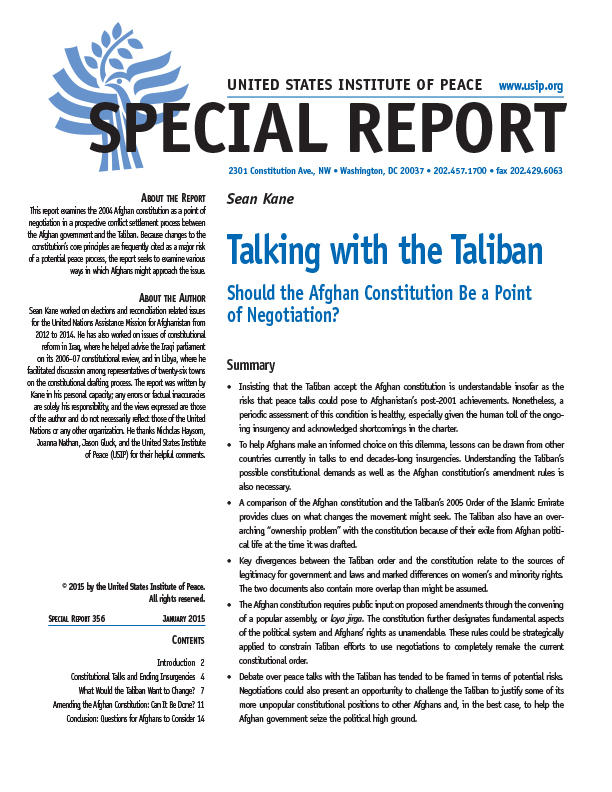Should the Afghan Constitution Be a Point of Negotiation?
Drawing on the comparative experiences of governments negotiating with insurgencies in the Philippines, Myanmar, and Colombia, as well as a detailed examination of the Taliban’s possible constitutional demands, this report examines the 2004 Afghan constitution with respect to its potential inclusion in peace talks between government and Taliban leaders. It argues that, if the issue is handled carefully and with strategic intent, the Afghan government may be able to seize the political high ground by challenging the Taliban to justify some of its more unpopular constitutional positions to other Afghans.
Summary
- Insisting that the Taliban accept the Afghan constitution is understandable insofar as the risks that peace talks could pose to Afghanistan’s post-2001 achievements. Nonetheless, a periodic assessment of this condition is healthy, especially given the human toll of the ongoing insurgency and acknowledged shortcomings in the charter.
- To help Afghans make an informed choice on this dilemma, lessons can be drawn from other countries currently in talks to end decades-long insurgencies. Understanding the Taliban’s possible constitutional demands as well as the Afghan constitution’s amendment rules is also necessary.
- A comparison of the Afghan constitution and the Taliban’s 2005 Order of the Islamic Emirate provides clues on what changes the movement might seek. The Taliban also have an overarching “ownership problem” with the constitution because of their exile from Afghan political life at the time it was drafted.
- Key divergences between the Taliban order and the constitution relate to the sources of legitimacy for government and laws and marked differences on women’s and minority rights. The two documents also contain more overlap than might be assumed.
- The Afghan constitution requires public input on proposed amendments through the convening of a popular assembly, or loya jirga. The constitution further designates fundamental aspects of the political system and Afghans’ rights as unamendable. These rules could be strategically applied to constrain Taliban efforts to use negotiations to completely remake the current constitutional order.
- Debate over peace talks with the Taliban has tended to be framed in terms of potential risks. Negotiations could also present an opportunity to challenge the Taliban to justify some of its more unpopular constitutional positions to other Afghans and, in the best case, to help the Afghan government seize the political high ground.
About the Report
This report examines the 2004 Afghan constitution as a point of negotiation in a prospective conflict settlement process between the Afghan government and the Taliban. Because changes to the constitution’s core principles are frequently cited as a major risk of a potential peace process, the report seeks to examine various ways in which Afghans might approach the issue.
About the Author
Sean Kane worked on elections and reconciliation related issues for the United Nations Assistance Mission for Afghanistan from 2012 to 2014. He has also worked on issues of constitutional reform in Iraq, where he helped advise the Iraqi parliament on its 2006–07 constitutional review, and in Libya, where he facilitated discussion among representatives of twenty-six towns on the constitutional drafting process. The report was written by Kane in his personal capacity; any errors or factual inaccuracies are solely his responsibility, and the views expressed are those of the author and do not necessarily reflect those of the United Nations or any other organization. He thanks Nicholas Haysom, Joanna Nathan, Jason Gluck, and the United States Institute of Peace (USIP) for their helpful comments.
